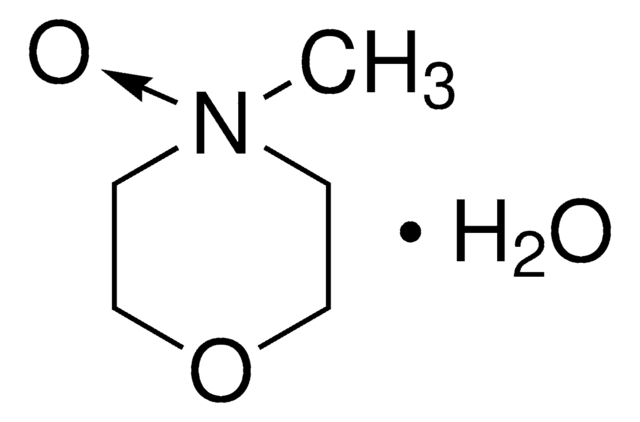All Photos(5)
About This Item
Empirical Formula (Hill Notation):
C5H11NO2
CAS Number:
Molecular Weight:
117.15
Beilstein:
507437
EC Number:
MDL number:
UNSPSC Code:
12352005
PubChem Substance ID:
NACRES:
NA.22
Recommended Products
Quality Level
Assay
97%
reaction suitability
reagent type: oxidant
mp
180-184 °C (lit.)
functional group
ether
storage temp.
2-8°C
SMILES string
C[N+]1([O-])CCOCC1
InChI
1S/C5H11NO2/c1-6(7)2-4-8-5-3-6/h2-5H2,1H3
InChI key
LFTLOKWAGJYHHR-UHFFFAOYSA-N
General description
4-Methylmorpholine N-oxide is an organic compound used as a co-oxidant along with OsO4 and ruthenates in organic synthesis. In recent studies, it has been used as a catalyst in silylcyanation of aldehydes and ketones. Lyocell, a regenerated cellulose fiber, can be prepared using 4-methylmorpholine N-oxide in an eco-friendly manner.
Application
Non-metallic catalyst for the cyanosilylation of ketones. Co-oxidant for Sharpless asymmetric dihydroxylation in ionic liquids.
Signal Word
Danger
Hazard Statements
Precautionary Statements
Hazard Classifications
Flam. Sol. 1 - Repr. 2
Storage Class Code
4.1B - Flammable solid hazardous materials
WGK
WGK 1
Flash Point(F)
Not applicable
Flash Point(C)
Not applicable
Choose from one of the most recent versions:
Certificates of Analysis (COA)
Lot/Batch Number
Don't see the Right Version?
If you require a particular version, you can look up a specific certificate by the Lot or Batch number.
Already Own This Product?
Find documentation for the products that you have recently purchased in the Document Library.
Customers Also Viewed
Synlett, 6, 1077-1079 (2004)
Marzieh Shafiei et al.
Bioresource technology, 102(17), 7879-7886 (2011-06-21)
Given that N-methylmorpholine-N-oxide (NMMO) is a promising alternative for the pretreatment of lignocelluloses, a novel process for ethanol and biogas production from wood was developed. The solvent, NMMO, is concentrated by multistage evaporation, and the wood is pretreated with the
N?Methylmorpholine N?Oxide
Encyclopedia of Reagents for Organic Synthesis, Second Edition (2008)
Luís C Branco et al.
The Journal of organic chemistry, 69(13), 4381-4389 (2004-06-19)
The use of room-temperature ionic liquids (RTILs) in the Sharpless catalytic asymmetric dihydroxylation (AD) as a cosolvent or replacement of the tert-butanol was studied in detail by screening 11 different RTILs. The AD reaction is faster in 1-n-butyl-3-methylimidazolium hexafluorophosphate [C(4)mim][PF(6)]
The N-Methylmorpholine-N-Oxide (NMMO) Process of Producing Regenerated Fibers
Innovative Biofibers from Renewable Resources (2014)
Our team of scientists has experience in all areas of research including Life Science, Material Science, Chemical Synthesis, Chromatography, Analytical and many others.
Contact Technical Service













